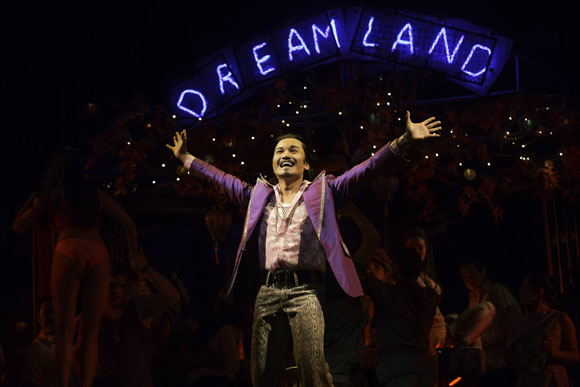Friday 16th May 2014 by Jack Newman
 |
| The star of the show: Jon Jon Briones as The Engineer |
Miss Saigon's vastness cannot be overstated. The storyline, taken from Puccini’s operatic masterpiece, is a sprawling tragedy that deals with love, war, greed, hope, fear, poverty, power and, ultimately, motherhood. The staging is more ambitious still with Saigon, Bangkok and New York all brought to life on stage; the successful depiction of bustling streets, army helicopters, victory parades, war zones, raunchy parties and desperate riots are all essential if the storyline is to be carried. With box office records smashed even in the Prince Edward’s large auditorium, there are a lot of people in possession of tickets who want to know whether these lofty ambitions have materialised and matched the success of the original production.
The short answer is a resounding yes! The setting for the play is the closing days and aftermath of the Vietnam War, with all the confusion, debauchery, misery and panic that this entailed. Amidst the politics and war shines the innocent love between an American soldier, who is disillusioned by recklessness of war (Chris, played by Alistair Brammer), and a young woman from rural Vietnam, who has fallen victim to the city (Kim, played by the unknown but hugely talented Eva Noblezada). And from the depths of war-torn Saigon emerges the single-minded greed and unstoppable charm of a club-owner and pimp who wants, above all else, to live the American dream (The Engineer, played by Jon Jon Briones).
The storylines surge forward together at a searing pace but they still allow time for the fascinating development of the major characters. The star of the show is undoubtedly Briones and his enigmatic Engineer. A character of this breadth and depth is indicative of the show as a whole. He is brutal, abusive and domineering when in a position of power, and sycophantic, nihilistic and cowardly when he is not, while his constant manipulation and plotting is deviously self-serving. Yet despite all of this, he is the most likeable character on the stage and received by far the loudest roar from a jubilant (and standing) crowd at the curtain call. To make such a detestable list of traits likeable requires a substantial stylish persona and a lavish explosion of stagecraft. Both boxes are certainly ticked and Briones (who actually played a barman in the original production 25 years ago) is utterly superb.
There are certain caveats in this largely adoring review. Some of the dialogue that is ‘sung-through’ could have benefitted from being spoken, as the actors may have had a chance to expand on their characters and build the audience’s attachment to their plights. Some may disagree and argue that a sung-through musical is the purest form, especially with Schönberg and Boublil’s other major success (Les Misérables) also being entirely sung-through. Even so, there are certain scenes that feel they exist purely to tie the rest of the show together, and, even though they are exceptionally well performed, they stick out in a production that is, in most places, simply mind-blowing.
To effectively describe the thoroughly impressive staging of this show, too much of the twisting storyline would have to be revealed, and it is imperative that you go yourself to witness this theatrical spectacular. I will have to make do in saying that the ingenious use of the stage, of props and of the set means that the ambition of the show is thoroughly realised. The fluidity of the moving parts creates a beautiful choreography that would dazzle viewers even without the presence of this captivating cast. Luckily for the viewer, they are very much present, and their talented portrayal of nuanced characters allows an imaginative and enthralling negotiation of the show’s grand themes, surpassing the artistic achievement of the original production.